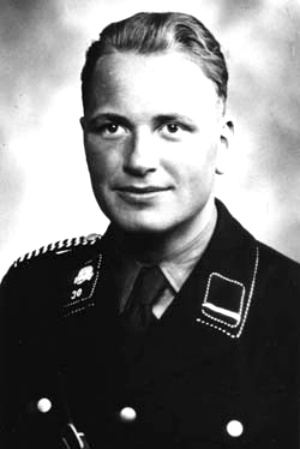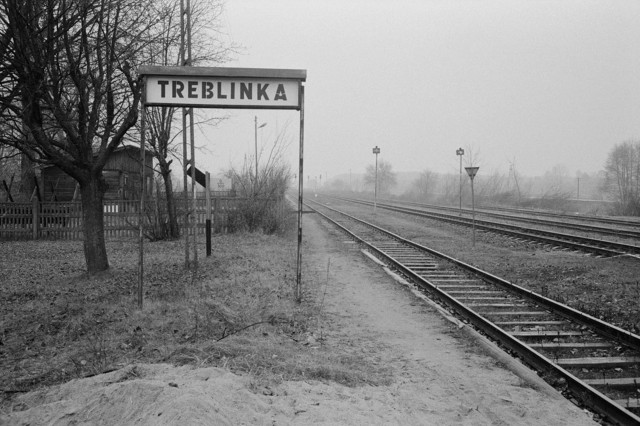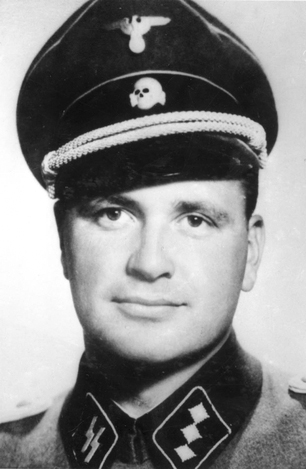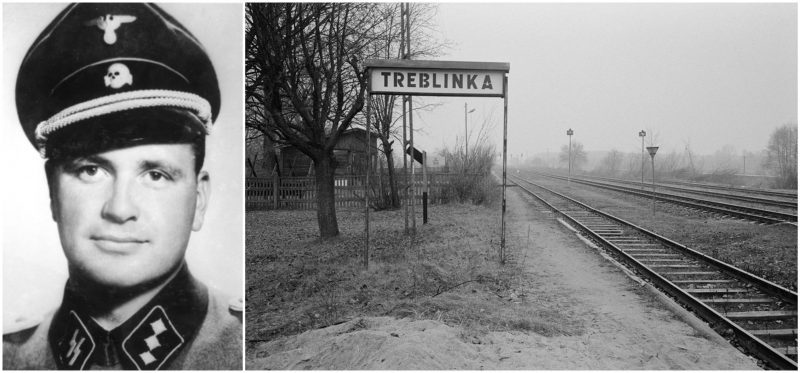Kurt Hubert Franz (born on 17 January 1914 — died on 4 July 1998) was an officer of the SS and one of many commanders at the Treblinka extermination camp. He was one of the biggest war criminals of the Holocaust period who was responsible for genocide.
Born in Düsseldorf in 1914, Franz first went to the public school in his birthplace from 1920 through to 1928, after which he began to work as a messenger. Before taking his final exams, he had begun an apprenticeship at the age of 15 – first as a cook for the “Hirschquelle” restaurant, and then later at the Hotel Wittelsbacher Hof.
Franz had one sister, and his mother was a practicing Catholic. When his father, who was a merchant by profession, died early, his mother remarried a man who had an outlook that was greatly influenced by strong right-wing nationalist ideas, which probably, in turn, influenced Franz’s joining several right-wing national groups and serving in the voluntary labor corps. In addition to all this, he also trained for over a year with a butcher.

After joining the Nazi Party in 1932, Franz joined the German Army in 1935. He got discharged in October 1937, after fulfilling his military obligations and after that went on to join the SS-Totenkopfverbände. Having first received training with the Third Death Head Regiment Thuringia at Weimar, he began his service at the Buchenwald concentration camp as a cook and guard and went on to rise to the rank of Unterscharführer (Corporal).
Having been recruited to Hitler’s Chancellery in the later period of 1939, Franz had been assigned to participate in the Action T4 euthanasia program. After serving as a cook at Sonnenstein Brandenburg, Grafeneck, and Hartheim, he was finally assigned as a cook at T4 headquarters in the later part of 1941.
Having been promoted to Oberscharführer (Staff Sergeant) on 20 April 1942, Franz, along with further veterans of Action T4, proceeded to Lublin concentration camp complex in the Generalgouvernement and was assigned to the Bełżec extermination camp; he stayed here until the end of August 1942.
After the chain of command in the Operation Reinhard death camp system changed, Franz was reassigned to the Treblinka extermination camp, where he rose to the rank deputy commandant under Christian Wirth. He served as the last camp commandant from August to November 1943 to oversee the conclusion of the Holocaust on the territory of occupied Poland.
His first tasks at Treblinka involved supervising work commandos, unloading transports, and transferring Jews from the undressing rooms to the gas chambers. In spite of having a very innocent-looking face (for which he was often called “Lalke” – the Yiddish word for ‘doll’ by the prisoners), his intentions were extremely sinister, to say the least.
A dominant overseer in day-to-day interactions with prisoners in Treblinka, he went on to become the most feared man at Treblinka who was known for his unflinching cruelty.

Famous for his extremely and unusually cruel and sadistic nature, Franz was known to make regular rounds of the camp and rode on a horse most of the time. He was also known to take Barry, his St. Bernard dog, along with him. Trained to strictly obey the commands of Franz, Barry was often commanded to bite the prisoners’ buttocks or genitalia. Based on his mood, Franz set Barry on any inmate who had attracted his attention.
When Barry was to be set to attack any inmate, he was given the command “Mensch, faß den Hund!” (English: Man, grab that dog), where Barry, the dog, was the “man” and the inmate was the “dog” whom Barry was supposed to attack. Once the inmate was caught, Barry would bite him or her. A rather big dog, its shoulders could reach to the buttocks and abdomen of a man of average size – the reason why he often bit the inmates’ buttocks, abdomen or genitals.
In case the inmate was small or weak, the dog knocked him to the ground, only to maul him and leave him beyond recognition. However, Barry only behaved in this manner when Franz was present. In Franz’s absence, Barry was a gentle creature who never harmed anyone and allowed himself to be petted.
According to the soldiers and low-rank officers of the SS Franz had written the lyrics to a song that celebrated Treblinka and the genocide. The original song was actually written by Walter Hirsch – a prisoner, and the melody was provided by an SS officer at Buchenwald concentration camp.
It was taught to those selective Jews who, instead of being immediately executed, were made to work at the camp as laborers (Sonderkommandos) – their task being to memorize the entire song by nighttime on their first day at the camp. Ironically enough, the music of the song sounded very happy, as if the deaths were something to look forward to.
Looking squarely ahead, brave and joyous, at the world. The squads march to work. All that matters to us now is Treblinka. It is our destiny. That’s why we’ve become one with Treblinka in no time at all. We know only the word of our Commander. We know only obedience and duty. We want to serve, to go on serving until a little luck smiles on us again. Hurray!
Franz’s tasks also involved the reviewing of the prisoner roll and meting out punishments to the prisoners. For example, once when seven prisoners had attempted to escape the camp, Franz took them to the Lazarett and had them all shot, thereafter ordering a roll call and announcing any attempted escapes, especially if they were successful, would be dealt with by shooting ten prisoners for every escapee.

In line with his sadistic nature, Franz liked to shoot at prisoners with a hunting rifle or a pistol, especially those who were in the rail cars. One instance was when he selected the bearded men from the newly arriving transports and asked them if they believed in God. Once they replied “yes”, Franz made them hold up a bottle as a target, and tell them that he “would hit the bottle if God indeed exists,” and “would hit them if God doesn’t,” after which he would proceed to shoot at them with a gun anyway.
Having had some experience in boxing, Franz used his knowledge in the same in his rampage of sadism by using Jews as punching bags. After “challenging” a Jew to a boxing duel (where the Jew in question was forced to oblige), he gave the prisoner a boxing glove and kept one to himself. But what looked like a fair fight really wasn’t as Franz kept a small pistol in his glove that he kept for himself, eventually shot the prisoner dead once they were ready to box with their gloves on.
He would also use the heads of the prisoners, grabbing the victim’s lapel with one hand and striking them with the other. An expert at whipping, Franz never hit below twenty-five or fifty lashes, which is something he did slowly and with great pleasure. He also “liked” to kill babies from incoming transports by kicking them.
After being promoted to Second Lieutenant (Untersturmführer), Franz went on to become an appointed official on 21 June 1943, as ordered by Heinrich Himmler. On 2 August 1943, Franz, went for a swim in the Bug River nearby, along with four men from the SS and sixteen Ukrainians. This move severely undermined Treblinka’s security and greatly improved the chances of the prisoner revolt that happened at the camp that day.
As a result of the revolt, Franz Stangl – the camp’s commandant left and was replaced by Franz. As the new commander, Franz was entrusted with dismantling the camp and eliminating any evidence that could prove the camp’s existence and had some SS men, some Ukrainian guards and about a hundred Jewish prisoners at his disposal.
During September and October 1943, the Jews did all the physical work, and after the work at Treblinka was done, some 30-50 prisoners were sent to Sobibor for dismantling. The rest were shot and cremated on Franz’s orders.
In late autumn 1943, Franz was transferred to Trieste in northern Italy, where he participated in the persecution of partisans and Jews until the end of the war.
After the war
When Franz was tried for the Treblinka camps in 1965, he denied all the crimes he had actually committed, including setting his dog on a Jew and claimed to have only beaten a prisoner once.
On September 3 the same year he was given a life imprisonment sentence, having been found guilty of murdering at least 300,000 people and being charged with 35 counts of murder, besides attempted murder.
However, he was released in 1993 on the grounds of health issues. Kurt Franz died in Wuppertal in 1998.
